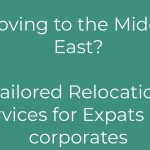The notion of relocating stirs a whirlwind of feelings – a sense of adventure intertwined with a dash of uncertainty. When the destination is the MENA region, a diverse and vibrant expanse spanning from the Middle East to North Africa, the narrative of relocation becomes increasingly captivating. Renowned for its fusion of rich traditions and dynamic modernity, this region is a magnet for aspiring ex-pats. But what about the costs? What salaries can you anticipate? Which industries are hiring? This guide aims to dissolve any perplexity and provide insights into life and career opportunities in the MENA region.
Estimating the Cost of Relocation
The cost of moving to a new country can vary significantly based on several factors. These include the cost of shipping belongings, visa fees, housing deposits, and potentially even a new vehicle. Relocation costs will vary by country, city, and personal requirements in the MENA region. It’s recommended to obtain quotes from reputable moving companies to get a realistic estimate of the cost.
Living Expenses across the MENA Region
Living expenses will depend largely on your lifestyle and the city you choose. For example, while Dubai is known for its higher living costs, cities like Amman in Jordan or Tunis in Tunisia may offer lower costs. Housing will generally be the most significant portion of your budget. Besides, costs for utilities, food, transportation, and leisure activities should also be considered.
Salary Expectations
Salaries in the MENA region vary greatly depending on the industry, job role, and level of experience. For example, a mid-level IT professional in Dubai could expect a monthly salary of around AED 20,000, while in Cairo, Egypt, the same role might yield a salary closer to EGP 15,000 per month.
Job Security and Growth Opportunities
In terms of job security, the MENA region provides a dynamic landscape. Countries like the UAE, Saudi Arabia, and Qatar are home to numerous multinational corporations providing stable job opportunities. Conversely, regions undergoing political or economic transformation may offer less stability and unique growth opportunities.
Thriving Industries
Oil and gas have traditionally dominated the MENA region, but economic diversification is occurring rapidly. The UAE is a hub for aviation and tourism; Saudi Arabia is investing heavily in its Vision 2030 transformation plan, boosting sectors like entertainment and tourism, while Egypt’s IT and telecommunications sector is booming. Morocco and Tunisia are witnessing growth in their automotive and textile industries.
Conclusion: Things to Consider
Relocating to the MENA region is a significant decision that requires comprehensive planning. Consider the cost of living and potential earnings, understand the political and economic stability of the chosen country, research the thriving industries, and assess job security. Above all, ensure you’re ready to embrace a new culture, language, and way of life.
The MENA region, with its rich history and growing economies, offers a plethora of opportunities for those prepared to embark on this exciting journey. Tradition and innovation coexist, paving the way for a vibrant professional and personal life.









